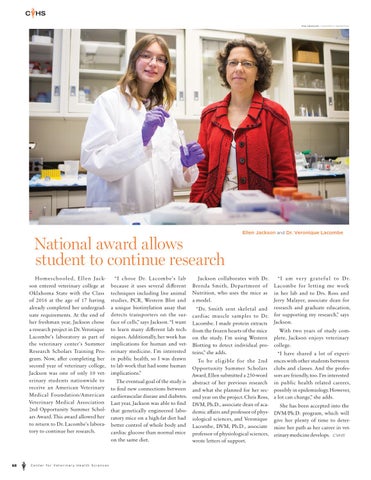PHIL SHOCKLEY / UNIVERSITY MARKETING
National award allows student to continue research Homescho oled, Ellen Jackson entered veterinary college at Oklahoma State with the Class of 2016 at the age of 17 having already completed her undergraduate requirements. At the end of her freshman year, Jackson chose a research project in Dr. Veronique Lacombe’s laboratory as part of the veterinary center’s Summer Research Scholars Training Program. Now, after completing her second year of veterinary college, Jackson was one of only 10 veterinary students nationwide to receive an American Veterinary Medical Foundation/American Veterinary Medical Association 2nd Opportunity Summer Scholars Award. This award allowed her to return to Dr. Lacombe’s laboratory to continue her research.
68
C e n t e r f o r Ve t e r i n a r y H e a l t h S c i e n c e s
Ellen Jackson and Dr. Veronique Lacombe
Jackson collaborates with Dr. “I chose Dr. Lacombe’s lab because it uses several different Brenda Smith, Department of techniques including live animal Nutrition, who uses the mice as studies, PCR, Western Blot and a model. a unique biotinylation assay that “Dr. Smith sent skeletal and detects transporters on the sur- cardiac muscle samples to Dr. face of cells,” says Jackson. “I want Lacombe. I made protein extracts to learn many different lab tech- from the frozen hearts of the mice niques. Additionally, her work has on the study. I’m using Western implications for human and vet- Blotting to detect individual proerinary medicine. I’m interested teins,” she adds. in public health, so I was drawn To be eligible for the 2nd to lab work that had some human Opportunity Summer Scholars implications.” Award, Ellen submitted a 250-word The eventual goal of the study is abstract of her previous research to find new connections between and what she planned for her seccardiovascular disease and diabetes. ond year on the project. Chris Ross, Last year, Jackson was able to find DVM, Ph.D., associate dean of acathat genetically engineered labo- demic affairs and professor of physratory mice on a high-fat diet had iological sciences, and Veronique better control of whole body and Lacombe, DVM, Ph.D., associate cardiac glucose than normal mice professor of physiological sciences, on the same diet. wrote letters of support.
“ I a m ve r y g ra t e f u l t o D r. Lacombe for letting me work in her lab and to Drs. Ross and Jerry Malayer, associate dean for research and graduate education, for supporting my research,” says Jackson. With two years of study complete, Jackson enjoys veterinary college. “I have shared a lot of experiences with other students between clubs and classes. And the professors are friendly, too. I’m interested in public health related careers, possibly in epidemiology. However, a lot can change,” she adds. She has been accepted into the DVM/Ph.D. program, which will give her plenty of time to determine her path as her career in veterinary medicine develops.
